九年级英语Wherewouldyouliketovisit教案_2
九年级英语Where would you like to visit上课学习上课学习教案_2
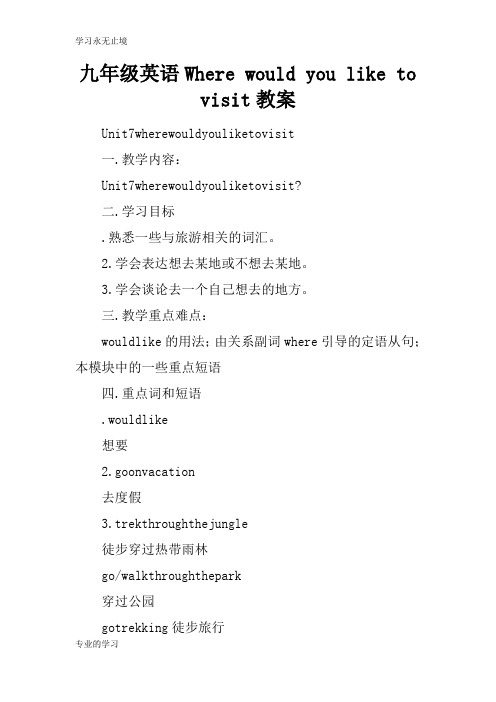
九年级英语Where would you like tovisit教案Unit7wherewouldyouliketovisit一.教学内容:Unit7wherewouldyouliketovisit?二.学习目标.熟悉一些与旅游相关的词汇。
2.学会表达想去某地或不想去某地。
3.学会谈论去一个自己想去的地方。
三.教学重点难点:wouldlike的用法;由关系副词where引导的定语从句;本模块中的一些重点短语四.重点词和短语.wouldlike想要2.goonvacation去度假3.trekthroughthejungle徒步穿过热带雨林go/walkthroughthepark穿过公园gotrekking徒步旅行【即学即用】⑴Theywalkedthestreet.⑵Theriverrunsthecity.⑶Becarefulwhenyou thebusystreet.4.takeiteasy从容,轻松5.hopetodo希望hope+that从句6.someday(将来)有一天oneday(将来)有一天/(过去)一天7.considerdoingsth考虑做某事considersb.tobesth.把……视为……considersbas认为……【即学即用】⑴I’mconsideringmyhotel,Iwillcomeandleavemynewaddressinafewdays.A.tochangeB.changedc.changeD.changing⑵ThisbookisconsideredagreathelptostudentsofEnglish.A.tobeB.beingc.isD.was8.thecapitalofsp……的首都/省会9.oneoftheliveliestcitiesinEurope欧洲最有活力的城市之一oneofthemostfamouschurchesintheworld世界上最著名的教堂之一0.fantasticsights奇妙的景色1.ingeneral通常2.quiteanexpensiveplace一个高消费的地方3.translatethingsforsb为某人翻译事情4.unless除非【即学即用】⑴除非天气很冷,我爸爸通常开着窗户睡觉。
九年级英语where would you like to visi教案2
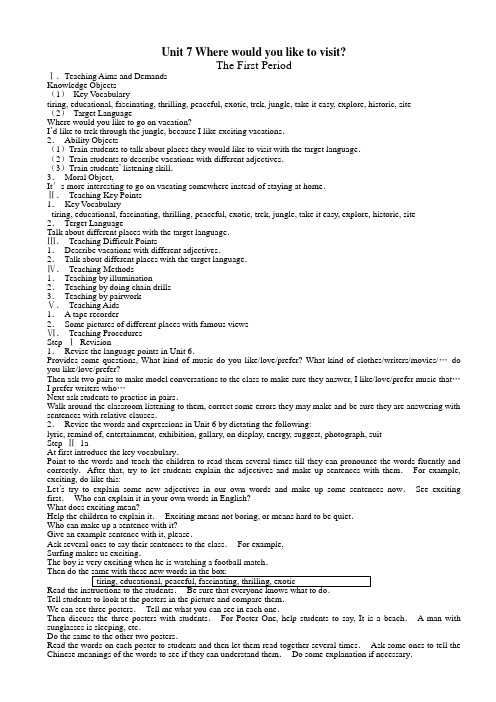
Unit 7 Where would you like to visit?The First PeriodⅠ.Teaching Aims and DemandsKnowledge Objects(1)Key Vocabularytiring, educational, fascinating, thrilling, peaceful, exotic, trek, jungle, take it easy, explore, historic, site(2)Target LanguageWhere would you like to go on vacation?I’d like to trek through the jungle, because I like exciting vacations.2.Ability Objects(1)Train students to talk about places they would like to visit with the target language.(2)Train students to describe vacations with different adjectives.(3)Train students’ listening skill.3.Moral Object,It′s more interesting to go on vacating somewhere instead of staying at home.Ⅱ.Teaching Key Points1.Key Vocabularytiring, educational, fascinating, thrilling, peaceful, exotic, trek, jungle, take it easy, explore, historic, site 2.Terget LanguageTalk about different places with the target language.Ⅲ.Teaching Difficult Points1.Describe vacations with different adjectives.2.Talk about different places with the target language.Ⅳ.Teaching Methods1.Teaching by illumination2.Teaching by doing chain drills3.Teaching by pairworkⅤ.Teaching Aids1.A tape recorder2.Some pictures of different places with famous viewsⅥ.Teaching ProceduresStep ⅠRevision1.Revise the language points in Unit 6.Provides some questions, What kind of music do you like/love/prefer? What kind of clothes/writers/movies/…do you like/love/prefer?Then ask two pairs to make model conversations to the class to make sure they answer, I like/love/prefer music that…I prefer writers who…Next ask students to practise in pairs.Walk around the classroom listening to them, correct some errors they may make and be sure they are answering with sentences with relative clauses.2.Revise the words and expressions in Unit 6 by dictating the following:lyric, remind of, entertainment, exhibition, gallary, on display, energy, suggest, photograph, suitStep Ⅱ1aAt first introduce the key vocabulary.Point to the words and teach the children to read them several times till they can pronounce the words fluently and correctly.After that, try to let students explain the adjectives and make up sentences with them.For example, exciting, do like this:Let’s try to explain some new adjectives in our own words and make up some sentences now.See exciting first.Who can explain it in your own words in English?What does exciting mean?Help the children to explain it.Exciting means not boring, or means hard to be quiet.Who can make up a sentence with it?Give an example sentence with it, please.Ask several ones to say their sentences to the class.For example,Surfing makes us exciting.The boy is very exciting when he is watching a football match.Tell students to look at the posters in the picture and compare them.We can see three posters.Tell me what you can see in each one.Then discuss the three posters with students.For Poster One, help students to say, It is a beach.A man with sunglasses is sleeping, etc.Do the same to the other two posters.Read the words on each poster to students and then let them read together several times.Ask some ones to tell the Chinese meanings of the words to see if they can understand them.Do some explanation if necessary.Call the students’ attention to the chart.Point to vacation 1,2 and 3 in the chart.Say, Let’s choose the adjectives from the box for the three vacations.The adjectives you choose should correspond with the posters.Now let’s use Vacation 1 as a sample.Which adjectives should we choose? Who can tell me? Then ask several students to tell the class the words they’ve chosen.Write down their answers on the blackboard like this:Vacation 1 Take it easy on a Florida beach!Adjectives: relaxing, peaceful, boringWho has got some other adjectives to describe it? Some other adjectives you know, but not in the box?Ask some to say more besides the ones in the box, such as quiet, lazy.Write them on the blackboard, too.Please fill in the chart with the adjectives now.Note to match the posters.Get them to fill in the answers by themselves.As they work, move around the room checking their progress and answering questions they may have.Check the answers.Step Ⅲ1bWe’ll listen to three students talking about where they would like to go on vacation and why.See the sample answers in the chart.Write your answers like that while you hear.Look at the three posters in Activity la and do this part.Each one of the three students, Sam, Gina and Lydia, wants to go to one of the three places.Play the tape for the first time, and tell the students not to write in a hurry, just try to catch the main idea of the dialogue.Then play the recording again.Ask them to write their answers this time.Check the answers.Step Ⅳ1cPresentate this dialogue, showing some pictures of the places with great interest all over the world and say like this: I’d like to travel to France.I’d love to visit Paris, because I like relaxing vacations.Where would you like to go on vacation, Sam?Ask one student to answer the question.After that let him or her ask another student.Set off a chain drill like this:T: I’d love to visit Paris, because I like relaxing vacations.Where would you like to go on vacation, S1?S1:I’d like to climb Mount Emei, because I like dangerous vacations.Where would you like to go on vacation, S2? S s :I prefer to travel to the USA, because I like exotic vacations.Where would you like to go on vacation, S3?S3…After a team finished get the children to make their own conversations in pairs.Ask two students to read the example in the speech bubbles in Activity la.Tell them to talk about the posters with their partners this time.As students work together, move around the classroom, offering language support as needed.Ask some pairs to say their conversations to the class.Step ⅤSummaryIn this class, we’ve learned some adjectives that are used to describe vacations and some other words.We have also learned the target language—Where would you like to go on vacation? I’d like to trek through the jungle because I like exciting vacations.Step ⅥHomework1.Try to remember the new key vocabulary.2.Write out three similar conversations to the example in the picture in Activity 1a.Step ⅦThe Second PeriodⅠ.Teaching Aims and Demands1.Knowledge Objects(1)Key V ocabularyfall, Niagara Falls(2)Target LanguageWhere would you like to visit?I’d like/hope to visit/see…I’d like/love places where…2.Ability Objects(1)Train students’ listening skill.(2)Train students’ communicative competence.3.Moral ObjectIt can make you know more about the world to travel much.Ⅱ.Teaching Key Points1.New words fall, Niagara Falls2.Listening practice with target language3.Make communications with target languageⅢ.Teaching Difficult Points1.Train students’ listening practice with target language.2.Help students to make communications with target language.Ⅳ.Teaching Methods1.Listening 2.Pairwork 3.ExplanationⅤ.Teaching Aids1.A tape recorder2.Some pictures of Hawaii, Mexico and Niagara FallsⅥ.Teaching ProceduresStep ⅠRevision(1)Revise the target language by asking question, Where would you like to go on vacation?Get several students to give different answers.Then ask them to work in pairs to practise with:Where would you like to go on vacation?I’d like/love to…because I like…vacations.(2)Check homework by asking several ones to read their conversations.(3)Check homework by dictating the following words:tiring, educational, fascinating, thrilling, relaxing, dangerous, exotic, trek.jungle, take it easy, explore, historic After dictating, hove students check in pairs.Make a survey by asking them to put up hands to see how many have written out all the words correctly.Step Ⅱ2aRead the instructions to the students.Look at the four sentences in the box.They are from a conversation, but they are not in the right order.We will listen to a conversation talking about going on a vacation.We can see the number in from of the fourth sentence.It’s a sample answerPlease write the right numbers before the first three sentences in the blanks.Then play the tape.Students only listen this time.Try to catch the main idea of the conversation.Next play the tape again.Students listen and write the numbers in the blanks.Check the answers.Step Ⅲ2bThis activity provides listening practice using the target language, too.Read the instructions to students, and make sure that they know what to do.Look at the first column, "Place".Someone doesn’t like going to these places.Why? Choose the reason for each place from the second column.Write the letters of the reasons in the blanks before the places/Let’s read the contents in the chart first.Get them to read the places and reasons several times.Then say, we’ll listen to the same recording again.Listen and match each place with a reason for not going there.Play the recording again.Ask students to fill in their answers.Check the answersStep Ⅳ2cRead the instructions to the students.Tell them to use the information in Activities 2a and 2b to role play conversations.(Holding a picture of Hawaii).I hope to visit Hawaii some day.Get a student to answer, So do I.I like places where the weather is always warm.Showing a picture of Mexico, ask two students to make up similar conversations.Note to use the information in Activities 2a and 2b.Do the same with the third place Niagara Falls.Say, Now please role play the conversations in pairs, using the information in Activities 2a and 2b.Each pair makes one at least.As the students work, move around the room checking progress of the pairs and offering help as needed.Ask one or two move pairs to say their conversations to the class.Step 5 Grammar FocusPresentate the conversation below by saying to the students and writing it on the blackboard:Where would you like to visit?I’d like to go somewhere relaxing.Draw a line under the word relaxing.Then ask the children the same questions and tell them to answer in their own words.For example,I’d like to go somewhere interesting.I’d like to go somewhere exotic.After asking several children to give answers with different adjectives, get them to practice in pairs.Each pair makes two conversations.Next ask several pairs to share their conversations with the class.Then say, the adjectives usually come before the nouns, such as, an educational vacation, a tiring trip.But in the sentences which are using the word something or somewhere, the adjective should be put after the pronouns.For example:I’d like to go somewhere fascinating.I’d love to eat something delicious.After that, presentate another pair of sentences.Say to the students and write down on the blackboard:Where would you like to visit?I hope to go to France some day.Explain sentences with some day in English orally, like this,I hope to go to France some day.This sentence means I hope to go to France some day, but I’m not sure I will.Maybe I will go there in the future and maybe I won’t.The sentences with some day are often used to express that.Then have the children make up more sentences.Step ⅥSummaryIn this class, we’ve done some listening practice with target language.We have also practiced our oral English in pairs.And we’ve discussed something on grammar.Step ⅦHomework1.Write out two pairs of sentences like this:Where would you like to visit?I’d like to go somewhere relaxing.Where would you like to visit?I hope to go to France some day.2.Practice the target language orally with the classmates.Step ⅧThe Third PeriodⅠ.Teaching Aims and Demands1.Knowledge Objects(1)Key V ocabularytouristy, spotlight" Singapore, beautiful, heavy, private, downtown, get around, Pack, light(2)Target LanguageWhere would you like to go, Kathy?I’d like to visit Kunming.2.Ability Objects(1)Train students’ reading skill.(2)Train students’ skill of communication.3.Moral ObjectShare your experience on travelling in a city with your classmates and tell them what they should bring if they decide to visit it.Ⅱ.Teaching Key Points1.Guide students to read the passage in Activity 3a.2.The new vocabularyⅢ.Teaching Difficult PointHelp students to talk to their partners about the cities they know.Ⅳ.Teaching Methods1.Teaching by illumination.2.Teaching by asking questions.Ⅴ.Teaching ProceduresStep ⅠRevision1.Revise the target language they learned last class by asking Where would you like to go on vacation? Get several children to answer I’d like to…because…2.Check the homework by asking some children to read the conversations they wrote to the class.Step Ⅱ3aAt first introduce the key vocabulary words.Teach students to read the vocabulary several times until they can read them out easily and correctly.Read the passage quickly and try to answer the questions on the blackboard.Write these questions on the blackboard:1.What doesn’t Singapore have?2.What does Singapore have?3.Is Singapore also a wonderful place for shopping?4.What don’t you plan on doing in singapore? why?5.What is easiest to do in Singapore?6.What is suggested to bring if you decide to go there? Why?A few minutes later(maybe two or three minutes), ask different students to answer the questions.Play the video tape of Singapore for students or show them some pictures.Next, read the instructions to students.Say, What things do you like about visiting Singapore and what things don’t you like? Read the passage again.Circle the things you like about visiting Singapore and underline the things you don’t like.Get them to finish the activity on their own.Check the answers.Step Ⅲ3bRead the instructions to students.Make sure that they know what to do.Ask two students to read the sample conversation on the left in Activity 3b,Note to correct any pronunciation errors to make sure the students are providing a good model for the rest of the class.Ask another pair to model a conversation with the first group of words on the right, the words in the first line.Listen to them carefully with the whole class to see if they can put the words in the proper places.Then let the whole class practice in pairs.Each pair should make up four conversations with the information on the right.Walk around the classroom as the students are working.Listen to some pairs and see if they have met any problems.Offer some help as needed.After all the students have finished practicing, ask some more pairs to share their conversations with their classmates.Step ⅣPart 4Read the instructions to the children.Make sure that they understand it.Say, First think of a city you know, everyone.I think of Dalian.What about you?Ask several ones to tell the names of the cities they’ve thought of.Then say, Please write down the name of the city you’ve thought of on the line above city name in the chart.After that, show some photos of Dalian to the students around the room.Then continue saying, Dalian is a very beautiful city with wonderful beaches.It has very long coast.It also has quite a few big and nice parks.Some are near the sea and some are not.I like the big museum of different kinds of sea animals, too.What about you? What do you like about the cities you’ve written in your book?Ask two or three to say something about their cities.Then say, Now please fill in the left box with the things you like about the city.I’ll write mine on the blackboard, you can use it as a sample.Write the sample on the blackboard, and students write out theirs.Walk around the classroom and direct them to write.After all of them have finished, go on with the third step.Now talk to your partner about the things you don’t like.After they finish talking, go on saying something I don’t like about Dalian to them.For example, The things in Dalian are too expensive.They are for the rich.And there are too many cars running on the streets.It’s very hard for people to cross a street.Can you say something you don’t like about your cities?Ask some to say something on that to the class.Then tell them to fill in the box for things you don’t like.Let them talk to their partners about it.Step ⅥSummaryIn this class, we’ve learned something about Singapore, and we’ve talked about some other places all over the world.We’ve done a lot of listening, speaking, reading and writing practice using the target language.Step ⅦHomework1.Write a short passage on the city you talked about in class.2.Try to remember the new words on page 54.Step ⅧThe Fourth PeriodⅠ.Teaching Aims and Demands1.Knowledge Objects(1)Key V ocabularycustomer, save money, pool, culture, dream vacation, travel agency(2)Target LanguageWhere would you like to go?I’d like to go somewhere warm.2.Ability Objects(1)Train students’ listening ability.(2)Train students to use the target language in oral English properly.3.Moral ObjectTo role play the conversations you’ve heard is a very good way to improve your oral English.Ⅱ.Teaching Key PointTrain students’ listening skill by listening to the conversations with the target language.Ⅲ.Teaching Difficult PointHelp students to role play the conversations.Ⅳ.Teaching Methods1.Brainstorm2.Listening method3.PairworkⅤ.Teaching AidA tape recorderⅥ.Teaching ProceduresStep ⅠRevision1.Revise the passage about Singapore by asking two or three students to read it to the class.Make sure that they pronounce each word correctly.Then let students read it aloud once by themselves.2.Check the short compositions they have written at home.First let several ones read theirs to the class.Second, get them to work in pairs to check the compositions.At last, collect all students’ compositions.Go over them carefully after class.Step ⅡPart 1This activity reviews the target language and introduces new vocabulary.Read the instructions to students.Explain brainstorm like this:Brainstorm a list of things means you should write down all the ideas that come into your minds.Now brainstorm a list of things that are important to you when you go on vacation.Write them down in your exercise books.You should not worry if an idea is silly or if a word is spelled wrong.You can even write a word in their first language for the moment.Ask them to have a look at the two model phrases the book provides before they begin.Move around the room offering language support as needed.After about three minutes, tell them to stop writing and thinking.Let’s review the ideas you’ve thought of together.We will correct spelling and find the correct English words for any words you don’t know.Then ask some children to read their lists to the class.Write any new words orphrases they have used on the blackboard.Ask them to discuss the lists in groups of four.Each one reads his or her own list to the other three.Then they discuss the words or phrases together.If there is something that they are not sure, tell them to show me by putting up their hands.Move around the room and solve the problems they may have.Help students find the correct English words to express their ideas.Step Ⅲ2aRead the instructions to students.Tell them to guess the meaning of travel agency first.Then explain it like this: If you plan to have a trip or vacation, you can go to a travel agency.A travel agency is an office that can help you make travel plans.Also they help you get plane tickets and hotel reservations.Then presentate whale watch and amusement park to the class like below.A whale watch tour means you stay in a ship and go out to the oceaningduring the time of year when the whales are migrating, then you can see them travelling.Amusement park means a place like disneyland.You can do lots of rides and play lots of games there.Write the two phrases on the blackboard.Look at the three pictures in Activity 2a now.We know Jeff has a summer job at a travel agency.We will hear him talking on the phone with three different people.Can you see the small box in the corner of each picture? Listen to the conversations and number the pictures.Write a proper number in each box to show the right order of the pictures.Then play the tape for the first time.Tell them only to listen.Play the tape a second time.As they listen to the tape this time, have the students number the pictures.Check the answers.Step Ⅳ2bRead the instructions to the children.Tell them to look at the chart.Then read the headings Customer, Wants, Doesn’t want and point out the blanks under each one.And let them see the sample answer under Wants in the chart.Ask them to read it together.Say, Then first customer wants to go somewhere warm.I’ll play the recording again.Please write down the things the three customers want and don’t want in this chart as you listen to the recording.The play the recording again.Students fill in the blanks with the words they hear.Pause the tape several times to give students time to fill out the chart.Correct the answers.Step Ⅴ2cThis activity provides guided oral practice using the target language.Read the instructions to the children.Say, In this activity, you are asked to role play Jeff’s conversation with the information in the chart in Activity 2b.Ask a pair of students to read the sample conversation to the class.Offer more phrases,…to go to a small town,…to go by ship,…to go to a place which is too crowded, …to travel by plane,…to go to anywhere too far, ect.Write them on the blackboard.Then ask students to practice in pairs.Move around the room checking the progress of the pairs and offering help as needed.Ask one or two pairs to say their conversations to the class.Correct any mistakes they may have made.Step ⅥSummarySay, In this class, we’ve done lots of listening practice on target language, and we’ve also written and spoken some.Step ⅦHomework1.Write out the phrases you have brainstormed in Activity 1.2.Write down the conversation in Activity 2c.StepThe Fifth PeriodⅠ.Teaching Aims and Demands1.Knowledge Objects(1)Key Vocabularyprovide, firm, offer, spot, Confucius, stele, forestThe Forest of Steles(2)Reading practice using the target language(3)Writing practice using the target language2.Ability Objects(1)Train students’ reading skill.(2)Train students’ writing skill.(3)Train students’ listening and speaking skills.3.Moral ObjectAre you planning to take a trip this summer?Write an e-mail to a travel agency in English to get some information on vacations.Ⅱ.Teaching Key Points1.The new vocabulary.2.Read an e-mail.3.Write an e-mail.Ⅲ.Teaching Difficult PointWrite an e-mail.Ⅳ.Teaching Methods1.Scanning the e-mail to find out the answers2.Writing3.GroupworkⅤ.Teaching ProceduresStep ⅠRevision1.Revise the conversation in Activity 2c on page 55 by making a conversation with one student like this,T: Where would you like to go?S s: I’d like to go somewhere relaxing.T: What else can you tell me?S: I don’t want to go to big noisy cities.After that, ask them to practice in pairs.Ask several pairs to share their conversations with the whole class.2.Check their homework.Step Ⅱ3aThis activity provides reading practice using the target language.At first, introduce the key vocabulary words.Teach students to read the words and expressions several times.Then ask several to read to the class.Make sure that they can read the words fluently and correctly.Read the instructions to students. Make sure that each student knows what they will have to do.Go over the statements about the e-mail message with the whole class.Make sure that they can understand all the six sentences in the box.And tell them to put the six statements in their minds while they scan the e-mail below.Say, Boys and girls, please scan the e-mail in Activity 3a now.Try to get the main idea of the letter and find out the answers to the statements.Ask them to scan the letter individually, and write T, F or DK before each statement.After they’ve all finished scanning, check the answers with the whole class.Elicit why the false sentences are false at the same time.After checking the answers, tell the children to read the passage more carefully and prepare to answer the questions on the blackboard.After they’ve all finished reading, get some students to answer these questions.Encourage them to ask questions on what they don’t understand about the e-mail.Ask one student to read the letter to the class.Help him or her with the pronunciation.Then let all the students read the passage several times.Step Ⅲ3bRead the instructions to students.Ask: Who can explain the instructions in your own language?Choose two or three among those who have put up their hands to explain the instructions in English.They may say like this, Suppose I work for Ace Travel Agency and I have received the letter from S.T.Zhang.Then it is my duty to reply the e-mail and I have to tell where they should go on vacation.After they all know what to do, get them to begin writing.Move around the classroom as they write, offering help if necessary.Remember whose passage is excellent and prepare to ask them to read theirs to the class.After they’ve all finished writing, ask the students who have written very good passages to read theirs to the class.Let them work in pairs to correct the mistakes in the passage they’ve written.Tell them that they have to rewrite the letters after class and bring them to school tomorrow.Step ⅣPart 4Read the instructions to students.Say something about the three places in the chart.Showing some pictures of these places to the students, say like this, Qufu is a small city in Shandong Province.It is famous for Confucius.It was Confucius’ hometown.He was born there.The Great Wall is the pride of the Chinese people.It is very long and it is hard to believe that it was built over two thousand years ago.The Forest of Steles in Xi’an is a great place for people who are interested in writing Chinese with brushes.What do you think of the three places?Look at the chart in Activity 4.We can see the sample answer in the box about Qufu in the column of you.Continue saying, Now please fill in the boxes about The Great Wall and The Forest of Steles in Xi’an on your own.You can use the words above the chart or any other word.Tell them to write out the three students’ names in the proper places in the chart.Then get them to survey the three students.Let them work in groups of four.Ask a pair of students to read the model conversation in Activity 4 before they begin their own ones.At last, have several groups report the results to the class.Then ask the class where they would prefer to gotogether.Step ⅤSummaryIn this class, we’ve read an e-mail to a travel agency and we’ve also written an e-mail.And we’ve done some reading, writing, listening and speaking practice using the target language through group work.Step ⅥHomework1.Rewrite the e-mail which you wrote in class.2.Try to remember the new words and expressions on page 56.Step ⅧThe Sixth PeriodⅠ.Teaching Aims and Demands1.Knowledge Objects(1)Key V ocabularysurf, arctic(2)Use the following words properlyhope, pack, save, provide, cook(3)Write an article using the target language.2.Ability Objects(1)Train students to use the verbs hope, pack, save, provide and cook well.(2)Train students’ writing skill.3.Moral ObjectDo you want to travel abroad? Englishwill be very useful for you then.It is spoken all over the world.Ⅱ.Teaching Key Points1.Help students have a self check on the key words and target language.2.Practice using the verbs.hope, pack, save, provide, cook3.Write an article.Ⅲ.Teaching Difficult Points1.Use the verbs hope, pack, save, provide and cook.2.Write the article.Ⅳ.Teaching Methods1.Teaching by making sentences.2.Teaching by writing.Ⅴ.Teaching AidThe pictures of the four placesⅥ.Teaching ProceduresStep ⅠRevision1.Check the homework by asking students to show their e-mails.Choose several to read theirs to the class.Then let them work in pairs and read their own letters to the partners.At last, collect all the letters.2.Have a dictation to see if they can remember the new vocabulary which they learned last class.Dictate the following ones.provide, firm, offer, spot.the Forest ofSteles, ConfuciusStep ⅡPartFocus attention on the box.Invite a student to read the vocabulary words at the top.You are asked to fill in the blanks with the words.In some cases, you may need to use another form of the word, for example, adjusting for tense or subject/verb agreement.Ask students to fill in the blanks on their own.Check the answers.Ask students to make their own sentences with the words, preferably sentences that are meaningful.Move around the room.Collect a few students’ answers with mistakes on the blackboard.Along with the students help correct the mistakes.Step Ⅲ2。
人教版九级英语UnitWherewouldyouliketovisit教案
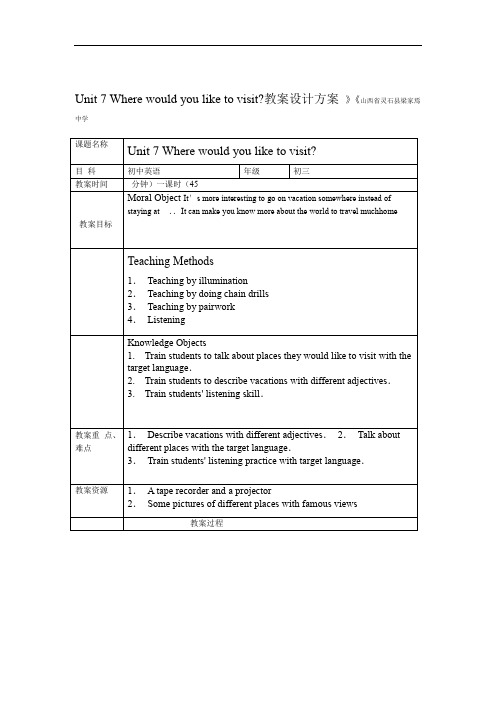
Unit 7 Where would you like to visit?教案设计方案》《山西省灵石县梁家焉中学
修改说明单词的学习放在句中或短语中或是某个情境:在学习过程中,曾有一
位老师讲到中要比单独记单词效果要好,我修订的这部分就是本节课单词新授的环节,原先只是把单词单独放在屏幕上学,修改后是出示图片让学生感受这个单词的意思,教了单词的发音后,就让学生根据图片用这一新单词来说话,因为学生是在用的基础上记单词,这样的效果要比单独教单词好的多。
校本研修过程
4 / 4。
九年级英语全册Unit7Wherewouldyouliketovisit教案2人教新目标版(new)

Unit 7 Where would you like to visit一. 教学内容:Unit 7 Where would you like to visit?二. 学习目标1. 熟悉一些与旅游相关的词汇.2. 学会表达想去某地或不想去某地。
3. 学会谈论去一个自己想去的地方。
三。
教学重点难点:would like 的用法;由关系副词where引导的定语从句;本模块中的一些重点短语四。
重点词和短语1. would like 想要2。
go on vacation 去度假3. trek through the jungle 徒步穿过热带雨林go / walk through the park 穿过公园go trekking 徒步旅行【即学即用】⑴They walked the street。
⑵The river runs the city.⑶Be careful when you the busy street.4。
take it easy 从容,轻松5. hope to do 希望hope + that 从句6。
some day (将来)有一天one day (将来)有一天/(过去)一天7. consider doing sth 考虑做某事consider sb。
to be sth. 把……视为……consider sb as 认为……【即学即用】⑴I’m considering my hotel, I will come and leave my new address ina few days.A。
to change B。
changed C. changeD. changing⑵This book is considered a great help to students of English。
A。
to be B。
being C. isD。
was8。
the capital of sp ……的首都 / 省会9. one of the liveliest cities in Europe 欧洲最有活力的城市之一one of the most famous churches in the world 世界上最著名的教堂之一10。
【K12学习】九年级英语Wherewouldyouliketovisit教案_2
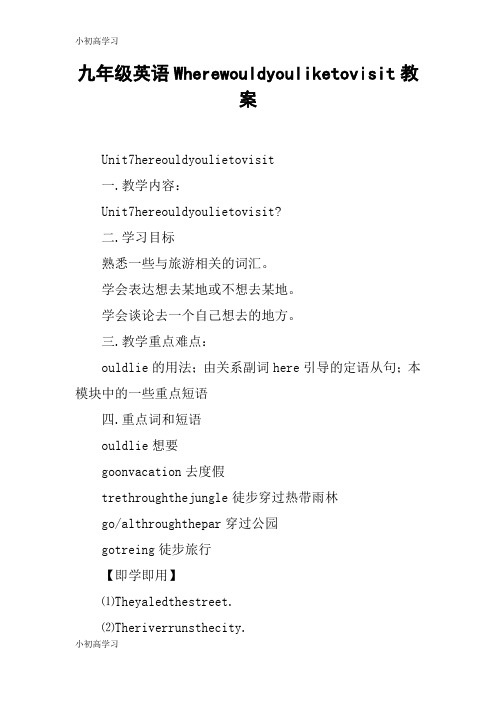
九年级英语Wherewouldyouliketovisit教案Unit7hereouldyoulietovisit一.教学内容:Unit7hereouldyoulietovisit?二.学习目标熟悉一些与旅游相关的词汇。
学会表达想去某地或不想去某地。
学会谈论去一个自己想去的地方。
三.教学重点难点:ouldlie的用法;由关系副词here引导的定语从句;本模块中的一些重点短语四.重点词和短语ouldlie想要goonvacation去度假trethroughthejungle徒步穿过热带雨林go/althroughthepar穿过公园gotreing徒步旅行【即学即用】⑴Theyaledthestreet.⑵Theriverrunsthecity.⑶Becarefulhenyouthebusystreet.taeiteasy从容,轻松hopetodo希望hope+that从句soeday有一天oneday有一天/一天considerdoingsth考虑做某事considersb.tobesth.把……视为……considersbas认为……【即学即用】⑴I’consideringyhotel,Iilleandleaveyneaddressinafedays.A.tochangeB.changedc.changeD.changing⑵ThisbooisconsideredagreathelptostudentsofEnglish.A.tobeB.beingc.isD.asthecapitalofsp……的首都/省会oneoftheliveliestcitiesinEurope欧洲最有活力的城市之一oneoftheostfaouschurchesintheorld世界上最著名的教堂之一0.fantasticsights奇妙的景色1.ingeneral通常quiteanexpensiveplace一个高消费的地方3.translatethingsforsb为某人翻译事情unless除非【即学即用】⑴除非天气很冷,我爸爸通常开着窗户睡觉。
【九年级】九年级英语Where would you like to visit教案
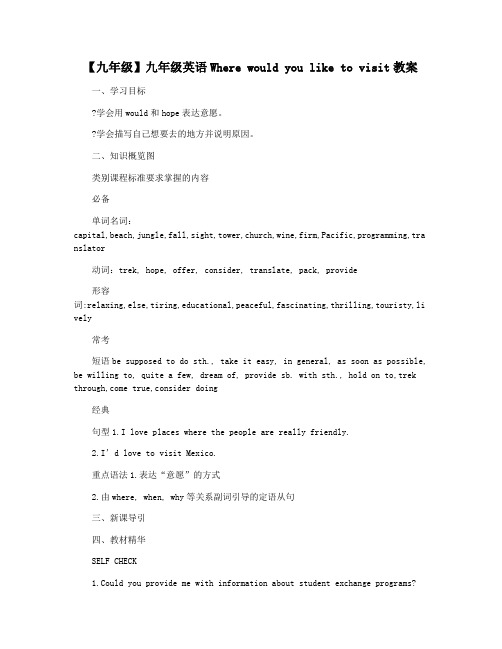
【九年级】九年级英语Where would you like to visit教案一、学习目标?学会用would和hope表达意愿。
?学会描写自己想要去的地方并说明原因。
二、知识概览图类别课程标准要求掌握的内容必备单词名词:capital,beach,jungle,fall,sight,tower,church,wine,firm,Pacific,programming,tra nslator动词:trek, hope, offer, consider, translate, pack, provide形容词:relaxing,else,tiring,educational,peaceful,fascinating,thrilling,touristy,li vely常考短语be supposed to do sth., take it easy, in general, as soon as possible, be willing to, quite a few, dream of, provide sb. with sth., hold on to,trek through,come true,consider doing经典句型1.I love places where the people are really friendly.2.I’d love to visit Mexico.重点语法1.表达“意愿”的方式2.由where, when, why等关系副词引导的定语从句三、新课导引四、教材精华SELF CHECK1.Could you provide me with information about student exchange programs?你能向我提供关子学生交流计划的信息吗?(1)could用来提建议或请求某人做某事,语气比can委婉、客气,其后的动词用原形。
(2)information是不可数名词,意为“通知,消息,信息,知识”。
新目标初中英语九年级《Unit 7 Where would you like to visit》Period 2教案
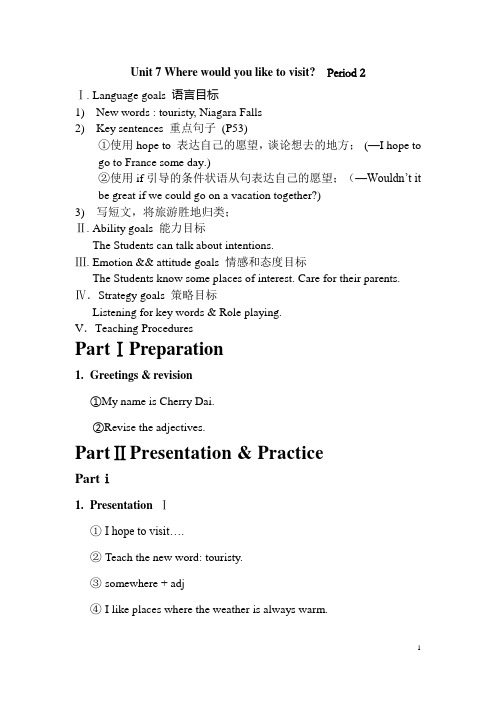
Unit 7 Where would you like to visit?Period 2Ⅰ. Language goals 语言目标1) New words : touristy, Niagara Falls2) Key sentences 重点句子(P53)①使用hope to 表达自己的愿望,谈论想去的地方;(—I hope togo to France some day.)②使用if引导的条件状语从句表达自己的愿望;(—Wouldn’t itbe great if we could go on a vacation together?)3) 写短文,将旅游胜地归类;Ⅱ. Ability goals 能力目标The Students can talk about intentions.Ⅲ. Emotion && attitude goals 情感和态度目标The Students know some places of interest. Care for their parents. Ⅳ.Strategy goals 策略目标Listening for key words & Role playing.V.Teaching ProceduresPartⅠPreparation1.Greetings &revision①My name is Cherry Dai.②Revise the adjectives.PartⅡPresentation & PracticePartⅰ1.PresentationⅠ①I hope to visit….②Teach the new word: touristy.③somewhere + adj④I like places where the weather is always warm.2.PracticeⅠ①Give the students some other places. Ask the whole class to makesentences like this in pairs. Then ask some pairs to show in the class.②Do some exercises.Part ⅱ1.Presentation ⅡRevise the use of “ if ”.2.PracticeⅡMake sentences with “if”.Partⅲ1.Presentation Ⅲ①If I were you, I would visit Niagara Falls .②Teach the new word: Niagara Falls③Revise the use of “ if ”.2.Practice Ⅲ①If I had lots of money, I would visit Mexico. The people there are friendly. But I don’t have lots of money, so I use had here and would here. How about you?②Now please make sentences like this.If I had lots of money, I would visit….Part ⅢProduction1. Circle the places you hear.2. Listening 2aNow boys and girls, some students are also talking about their vacation plan. Please turn to page53. Look at the four sentences. Please read it together. These sentences are not in the right order. Please pay attention the order and write down the right numbers in the blanks.Let’s check the answers: 3 4 2 1 Great! Thank you!If your answers are right, please raise your hands!3.Listening 2b①Well listen to it again.Look at 2b carefully. Listen and match the reason for not going there.Let’s check the answer: 1.b 2.a 3.CIf your answers are right, please raise your hands!②It’s a good listening material. Please turn to page132. Let’s read after it. Please read it loudly by yourselves. Who would like to read it? OK, you’re the girl, you’re boy1, you’re boy2. Thank you! Your spoken English are very wonderful.4.Doing exerciseNow boys and girls, close your books. Please take out this paper and do some exercises. Here are some questions about the listening material.5.Making plansMake group vacation plan together.4 Students are in one group. Please discuss about if your group have enough money, what places will you go? Why?Please tell the reasons. Each group write a report together and choose one student to read it. Then I’ll put it up on the blackboard. You can report like this:If we have enough money, we will visit Beijing University first. Because we think it is somewhere educational. We hope to study there one day. Next we hope to visit Disneyland. Because we like somewhere interesting. Then we’d like to go to France. Because it has some fantastic sights. Finally we’d love to go to Australia. Because it is winter now. It’s very different from China….PartⅣProgress1. SummaryNow let’s go over what we learned this class. What new words did we learn?Niagara Falls. How about the sentences?Let’s read it together. Where would you like to visit?I’d like to go somewhere relaxing.I hope to go to France some day.I’d love to visit Mexico.Pay attention, here the adjective should be put after somewhere, the pronouns.If I visit Hawaii, I’ll have a great time there!If I had lots of money, I would visit Niagara Falls.2. HomeworkWe’d better care for our parents. Please ask your parents where they would like to visit .And give the reasons. Let’s enjoy it together next lesson.Boys and girls, If you want to travel around the world, please learn English well. If you want to learn English well, please go for it! You’re really great! Best wishes to you! Thank you! Bye-bye!Unit 7 Where would you like to visit?Circle the places you hear:Make your group vacation planPlease make your vacation plan together. 4 or 6 Students are in one group. Discuss about: if your group have enough money, what places will you go? Why? Each group write a report together and choose one student to read it.You can report like this:(你可以这样写报告)There are many kinds of places of interest in China. Some places are educational, some are beautiful, some are relaxing, some are modern and so on. If I have enough money, I will visit somewhere relaxing. I hope to visit Hainan because I like the beautiful sea. It’s warm in winter. I can enjoy swimming in the sea. I’d like to collect lots of beautiful shells. ….Your report: (开头已给出)There are many kinds of places of interest in China. Some places are educational, some are beautiful, some are relaxing, some are modern and so on. If I have enough money, I will visit somewhere。
九年级Unit7英文教案 Where would you like to visit教案

Unit 7 Where would you like to visitPart 1: Teaching design (第一部分:教学设计)Structures: Would and hope to for expressing desiresTarget language: Where would you like to go on vacationI’d love to visit Mexico.I hope to go to France some day.Vocabulary: jungle, thrilling, fascinating, take it easy, tiring, educational, trek, touristy, pack, light, heavy, provide, offer Learning strategies: Classifying, Role playingSECTION AGoals●To learn to use Would and hope to for expressingdesires●To listen, speak and read about travelingProceduresWarming up by learning Would and hope to for expressing desires Hello, morning. Let’s first look at the sentences in the chat below: Where would you like to visit I’d like to go somewhere relaxing.I hope to go to France some day.I’d love to visit Mexico.In the sentences w ould, hope to, ‘d like to and ‘d love to are used for expressing desires.1a Writing and describingOn page 52 is a picture about the planning of vocation.Pick the proper adjectives on top left of page 52 to describe Vacation 1 and Vacation 2.More adjectives to be chosen from:bad beautiful quiet testy long quick tricky tough bright magnificent crazy mighty dizzy wasteful dull new wonderful nice sad nosy funny great nutritious short silly gigantic ordinary strange pretty happy prickly horrible1b Listening and fillingWhere would Sam and Gina like to go on vacationYou are to listen and fill in the chart on page 52.TapescriptBoy: Look at those travel posters. I’d love to go on a vacation. Girl: Where would you like to go, SamBoy: I’d love to go trekking in the Amazon jungle in Brazil.Girl: You wouldBoy: Sure. I like exciting vacations.Girl:Wouldn’t that be dangerousBoy: No, not really. How about you, Gina Where would you like to go Girl:Oh, I’m stressed out. I’d just like to relax on a beach… You know,a beautiful beach in Florida.Boy: That sounds peaceful.Person Places WhySam Brazil Likes exciting vacationsGina Florida Likes to relax on a beachNow you are going to read the listening script. Underline the phrases and circle w ould, hope to, ‘d like to and ‘d love to are used for expressing desires.1c Doing pairworkYou are going to practice conversations with your partner according to the vacation posters in 1a.Boy: Do you see those travel posters over there.Let’s go over and have a look.Girl:I’d love to go on a vacation. Where would you like to go, Li Haifeng Boy: I’d love to go hunting in Panquangou jungle in Shanxi.Girl: You wouldBoy: Sure. I like exciting vacations.Girl:Wouldn’t that be dangerousBoy:No, not really. How about you, Tian Hong Where wouldyou like to goGirl:Oh, I’m stressed out. I’d just like to relax beside a river… You know, a beautiful riverside park in Taiyuan.Boy: That sounds peaceful.2a Listening and numberingYou are going to listen to another conversation. This time listen and number the statements on page 53 in the order that you hear them.Now listen to it the second time. Jot down sentences with would, hope to, ‘d like to and ‘d love to used for expressing desires.TapescriptBoy1:Wouldn’t it be great if we could go on a vacation togetherGirl1: Yeah. That would be wonderful!Boy1: Where would we goGirl1: Well, I hope to visit Hawaii one day. Would you be interested in going thereRead the listening script and copy down all useful phrases.2b Listening and matchingOn page 53 is a chart with “ Place” and “Reason not to visit the place”. Listen again and match them.2c Doing pairworkRole play conversations using information from 2a and 2b. You may start this way:A: I hope to visit Hawai some day.B: I do, too. I like places where the weather is always warm.A:I’d like to go on a vacation with my classmate Li Hong.B:I hope to visit Wutai Mountain one day. Would you be interested in going thereA: I like places where the food is really delicious. Zhongqing is a nice place to visit.B: But Zhongqing is too touristy. Maybe we could go to Dali.A:Pingyao would be nice, but we don’t have the time.B:Why don’t we go to Lushan together It has everything—beautiful views, friendly people, exciting things to do…3a Circling and underliningOn page 54 is a newspaper article about Paris. While readingthe things you like about visiting Paris the thing you don’t like.Eiffel Tower and Notre Dame Cathedral, one of the most famous churches in the world.Traveling around Paris by taxi can cost a lot of money, butconvenient to take the it’s usually quiteunderground train to most places. In general, though, France is quite an expensive place. One thing that is not expensive in France, however, is the wine!Most people in France have learned English. But many people don’t like to speak English, especially in Paris. So unless you speak French yourself, it’s best to travel with someone who can translate things for you.Read the article the second time and blacken all the expressions. You may copy them after class.3b Doing pairworkIn pairs practice the conversation on the middle left of page54. And then make new conversations with the information in the box on the right in the box.A: Where would you like to goB:I’d like to visit Kunming.A:Isn’t it supposed to be very hotB:Yes, it is. I’m only going to pack lightclothes. But Kunming is also beautiful, andit has lots of wonderful sights.A: Where would you like to go for a sightseeing tripB:I’d like to visit Hong Kong.A:Isn’t it supposed to be very crowdedB: Yes, it is. But Kong Kong is also beautiful, and it has lots of great entertainment sights.A: Where would you like to go for the May Day vacationB:I’d like t o see Mexico City.A:Isn’t it supposed to be excitingB:Yes, it is. But I am going there for a relaxing trip. I don’t have lots to do there.A: Where would you like to visit for the National Day hollidaysB:I’d like to see New York.A:Isn’t it suppose d to be very touristyB: Yes, it is. But it is also a very fascinating place with lots of fantastic galleries.A: Where would you like to spend your Spring Festival vacationB:I’d like to fly to Sydney.A:Isn’t it supposed to be very expensive to go th ereB:Yes, it is. But it is also a very beautiful placewith fantastic beaches where you can lie down for asunbath.A: But you can also lie right here for a free sunbath, too.4 Doing pairworkIn pair you are going to think of a city you know. List things you like and things you don’t like about the city.Talk to each other about your findings.PingyaoThings you like Things you don’t likeThe Ancient Ming and Qing Streets City Wall of PingyaoRishengchang Exchange ShopQiao's CompoundWang's CompoundThe Temple of the City GodZhenguo TempleThe pollutionThe transportation The feesClosing down by reading a poemTerrible DreamI'm feeling rather ragged.I'm feeling rather rough.I'm looking like I stayed up late,and didn't sleep enough.I went to sleep at bedtimeand dreamt all through the night,but when I woke this morningI was feeling far from right.For though I drifted quickly,and slumbered long and deep,I'm totally exhausted'cause I dreamed I couldn't sleep!--Kenn NesbittSECTION BGoals●To practice w ould, hope to, ‘d like to and ‘d love to for expressing desires●To read and write on travelingProceduresWarming up by looking and sayingLook at the picture below and say what the bear wants to say.1 Brainstorming things for vacationAlmost everyone likes traveling, but what things are important to you when you go on vacation. Let’s have a brainstorming to list things important to you going on vacation.2a Listening and numberingJeff is working at a travel agency for the summer vacation. Listen to the conversations and number the pictures on page 55.TapescriptWoman1: Jeff, I have to go out for half an hour. Could you please answer the phone Just take messages and I’ll call people back.Jeff: Sure. Hello, Ace Travel. Jeff Marino speaking. How may I help you Woman2: I’d like some information on vacation packages, please.Jeff: My boss is out of the office for half an hour. Could she call you backWoman2:Actually, I’d like to get some information now, if you wouldn’t mind…Jeff: Oh, well, I guess it would be OK. So, where would you like to go Woman2:Oh, I don’t know. Somewhere warm.Jeff: Somewher e warm… How about HawaiiWoman2:Oh… no… I… I don’t like flying.Jeff:OK. Well, there’s always…Jeff: Hi, Ace Travel. Jeff Marino speaking.Man: Hello. I’d like to find out about your vacation packages.Jeff: Well, we have a great whale watch tour. You might like that. Man: Hmmmm… It depends on where it is. I don’t want to go anywhere cold. Jeff:Hmmm… let’s see. Yes, we have a summer whale watch tour…Jeff: Hi. Ace Travel. May I help youWoman3:I hope so. I saw your advertisement for vacations in California.We’d like to go somewhere that’s fun for kids.Jeff:Fun for kids… hmmm… How about Los Angeles Kids love visiting Hollywood.Woman3: Oh, but we don’t really like big cities.Jeff: See. Then maybe you’d enjoy…2b Listening and completingNow I will play the tape once again and you are to complete the chart on page 55.Wants Doesn’t want Customer 1To go somewhere warm To flyTo go anywhere cold Customer 2To have a summer whalewatch tourCustomer 3To go somewhere that’sTo go to big cities.fun for kidsNow read the listening script and copy down all the important phrases. go out for half an hour, answer the phone, take messages, call people back, like some information on vacation packages, be out of the office for half an hour, call you back, get some information now, somewhere warm, like flying, find out about…, have a great whale watch tour, go anywhere cold, have a summer whale watch tour, see an advertisement for vacations in… be fun for kids, love visiting Hollywood, really like big cities2c Doing pairworkLook at the chart on page 55 and role play Jeff’s conversations.A: Where would you like to goB:I’d like to go somewhere warm.A: What else can you tell meB:I don’t want to fly.A: Where would you like to goB: I like to go some where that’s fun forkids.A: What else can you tell meB:I don’t really like big cities.A: Where would you like to goB:I like to go somewhere that’s close to the sea.A: What else can you tell meB:I don’t really like big cities.3a Reading and checkingOn page 56 is an e-mailing message. Read it and check the statements in the chart on the top of the page.person has a lot of money to spend on theperson wants to relax and do nothing onperson is aperson hasperson likes toperson likes to go to anotherWhile reading, circle the structures for expressing desires, underline the expressions and blacken the linking words.Subject: Vacation From: . ZhangDear Ace Travel,My family and I want to take a trip this summer somewhere in the east of China. I hope you can provide me with some information about the kinds of vacations that your firm can offer. We would like to travel to an exciting place, and we won’t mind how far we have to go. It has to be a place where we can do lots of exercise; we especially love hiking and swimming, but any kind of exercise is fine. We also need to stay in an inexpensive hotel. It would be nice if our hotel had rooms with kitchensso we could save money by cooking our own meals. The room needs to be big enough for three people. Also, we’d like to stay at a place with a big pool or somewhere near the ocean. Could you please give me some suggestions for vacation spots Also, please let me know if it’s best to travel by plane, train or bus. We’d like to be away for about three weeks. Thank you very much.. Zhang3b Imaging and emailingImagine the you work for Ace Agency. You are to write an email message to . Zhang, telling where you think he or she should go on vacation. Subject: Vacation From: Deng MingDear . Zhang,From your e-mail message I understand that your and you want to take a trip this summer somewhere in the east of China. Now I’d like to provide me with some information about the kinds of vacations that our firm can offer. You said that you would like to travel to an exciting place, and you won’t mind how far you have to go. So why not go to Mount Wuyi in Fu Jian Province It is a beautiful place where you can do lots of exercise by hiking and swimming. You can also find an inexpensive hotel there. It is a fine hotel with kitchens so you could save money by cooking your own meals. The room are big enough for five people. Also, the hotel has a big pool close to the Minjiang River。
九级Unit英文教案Wherewouldyouliketovisit
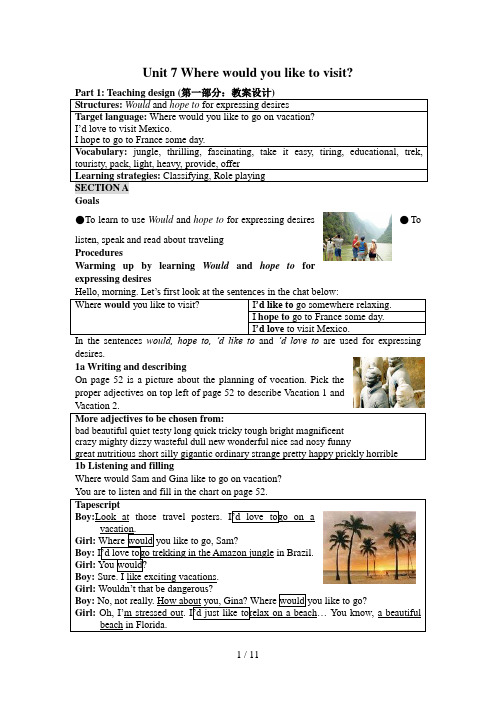
Unit 7 Where would you like to visit?Goals●To learn to use Would and hope to for expressing desires●To listen, speak and read about travelingProceduresWarming up by learning Would and hope to forexpressing desiresdesires.1a Writing and describingOn page 52 is a picture about the planning of vocation. Pick theproper adjectives on top left of page 52 to describe Vacation 1 andWhere would Sam and Gina like to go on vacation?1c Doing pairworkYou are going to practice conversations with your partner according to the vacation posters in 1a.Boy:Do you see those travel posters over there. Let’s goGirl:Boy:Girl:Boy: Sure. I like exciting vacations.Girl:Wouldn’t that be dangerous?Boy:No, not really. How about you, Tian Hong?you like to go?Girl:Oh, I’m stressed out.You know, a beautiful riverside park in Taiyuan.Boy: That sounds peaceful.2a Listening and numberingYou are going to listen to another conversation. This time listen and number the statements on page 53 in the order that you hear them.Now listen to it the second time. Jot down sentences with w ould, hope to, ‘d like toOn page 53 is a chart with “ Place” and “Reason not to visit the place”. Listen againRole play conversations using information from 2a and 2b. You may start this way: A: I hope to visit Hawai some day.B: I do, too. I like places where the weather is always warm.A:I’d like to go on a vacation with my classmate Li Hong.B: I hope to visit Wutai Mountain one day. Would you be interested in going there? A: I like places where the food is really delicious. Zhongqing is a nice place to visit. B: But Zhongqing is too touristy. Maybe we could go to Dali.A:Pingyao would be nice, but we don’t have the time.B:Why don’t we go to Lushan together? It has everything—beautiful views, friendly people, exciting things to do…after class.3b Doing pairworkIn pairs practice the conversation on the middle left of page 54. And then make newB:I’d like to visit Hong Kong.A:Isn’t it supposed to be very crowded?B: Yes, it is. But Kong Kong is also beautiful, and it has lots of great entertainment sights.A: Where would you like to go for the May Day vacation?B:I’d like to see Mexico City.A:Isn’t it supposed to be exciting?B:Yes, it is. But I am going there for a relaxing trip. I don’t have lots to do there.A: Where would you like to visit for the National Day hollidays?B:I’d like to see New York.A:Isn’t it supposed to be very touristy?B: Yes, it is. But it is also a very fascinating place with lots of fantastic galleries.A: Where would you like to spend your Spring Festival vacation?B:I’d like to fly to Sydney.B:Yes, it is. But it is also a very beautiful place withfantastic beaches where you can lie down for a sunbath.A: But you can also lie right here for a free sunbath, too.4 Doing pairworkIn pair you are going to think of a city you know. List thingsyou like and things you don’t like about the city.Terrible DreamI'm feeling rather ragged.I'm feeling rather rough.I'm looking like I stayed up late,and didn't sleep enough.I went to sleep at bedtimeand dreamt all through the night,but when I woke this morningI was feeling far from right.For though I drifted quickly,and slumbered long and deep,I'm totally exhausted'cause I dreamed I couldn't sleep!--Kenn NesbittSECTION BGoals●To practice w ould, hope to, ‘d like to and ‘d love to for expressing desires●To read and write on travelingProceduresWarming up by looking and sayingLook at the picture below and say what the bear wants to say.1 Brainstorming things for vacationAlmost everyone likes traveling, but what things are important to you when you go onJeff is working at a travel agency for the summer vacation. Listen to the conversations and number the pictures on page 55.find out about your vacation packages.On page 56 is an e-mailing message. Read it and check the statements in the chart on , circle the structures for expressing desires, underline the expressionsImagine the you work for Ace Agency. You are to write an email message to S.T.Georgie PorgieGeorgie Porgie, pudding and pie,kissed the girls and made them sigh.He's so cute they stand in linesjust to give him Valentines.--Kenn NesbittSELF CHECK1.Filling blanksOn the top of page 57 is a box with 5 sentences.Read them and fill in a correct given word.(Key: 1. provide 2. cook 3. saving 4. pack 5.hope)Then make your own sentences with each word given.1)hope: “I hope to finish this work tomorrow evening.” “I hope she understands that she cannot expect a raise.”2)pack: “Pack the books into the boxes.” “She packs a gun when she goes into themountains.”3)save: “She saved the old family photographs in a drawer.” “He saves half his salary.” “This move will save money.” “This will save money.”4)provide: “He provides for his large family by working three jobs.” “Provide for the proper care of the passengers on the cruise ship.” “The will provides that each chi ld should receive half of the money.” “The hostess provided lunch for all the guests.” “We provided the room with an electrical heater.”5)cook: “These potatoes have to cook for 20 minutes.” “The apothecary cooked the medicinal mixture in a big iron kettl e.” “Cook me dinner, please.” “Myhusband doesn't cook.”2.Looking and writingOn page 57 are 4 pictures. Write to tell which of theses placesLooking at the pictures below and imagine you are there.Reading: I’d love to sail across the Pacific.Before you read , go over the new words on page 151.While you read , listen to the recording of it, underline all the useful phrases andI. What is travel?Travel is the process of going from one place to another.Most people travel from home to work or school and others travel for fun and sightseeing. Some people write about traveling in books called autobiographies or journals.II. Recommended attractions of Shanxi Province●Yungang Grottoes, Datong●Hengshan Hanging Temple (Xuankong si), Datong●Nine Dragon Screen, Datong●Huayan Si, Datong●Ying Xian Wooden Pagoda, Datong●Mount Hengshan Scenic Spot, Datong●Jin Temple, Taiyuan●Chongshan Monastery, Taiyuan●Qiao's Family Compound (Qiao Jia Dayuan), Pingyao●Wang's Family Compound (Wang Jia Dayuan), Pingyao●Zhenguo Temple, Pingyao●Rishengchang Exchange Shop, Pingyao●Temple of the City God, Pingyao●City Wall of Pingyao, Pingyao●Wall of the Wuzhon mountains, Yungang●Wutai Shan (Five Terrace Mountain), Shanxi●Twin Pagoda Temple (Shuangta si), Taiyuan ●Shuanglin Temple, Pingyao11 / 11。
九年级Unit7英文教案_Where_would_you_like_to_visit2

Unit7. Where would you like to visit?Ⅰ. Teaching Objects1. Knowledge objectsKey words:heavy, provide, offer(2) Reading and writing practice using target language2. Ability object:Train students’ reading and writing skills.3. Moral object:Encourage students to write an e-mail.Ⅱ. Teaching key points1. The new words.2. Read and write an e-mail.Ⅲ. Teaching difficult pointWrite an e-mail.Ⅳ. Teaching aidsA projectorⅤ. Teaching proceduresStep 1:GreetingStep 2:RevisionDictate the words we have learned last class. (Ask several students to come to blackboard.)Step3:New wordsprovide, spot, eastern (Ask them to read after me. Then read by themselves.) Step4:3a Reading and checking(1) On page 56 is an e-mailing message. Read it and check the statements in the chart on the top of the page. Write T for (true), F for (false), DK for (don’t know).(2) Read again and answer questions. Where do S.T. Zhang and the family want to take a trip?. What kind of place do they want to go to?. What exercise do they especially love doing?. What does S.T. Zhang say about the hotel they want to live in?. What does S.T. Zhang want the Ace travel to do?. How long would they like to be away?(3) Read together.Step5: 3b Imaging and emailingImagine that you work for Ace Agency. You are to write an email message to S.T. Zhang, telling where you think he or she should go on vacation.4 Doing groupworkOn the bottom of page 56 is a survey. Read it and survey three students.Now complete the survey.Step 6: HomeworkWrite a reply to S.T. Zhang.。
新目标英语九年级教案Unit 7 Where would you like to visit?教案2
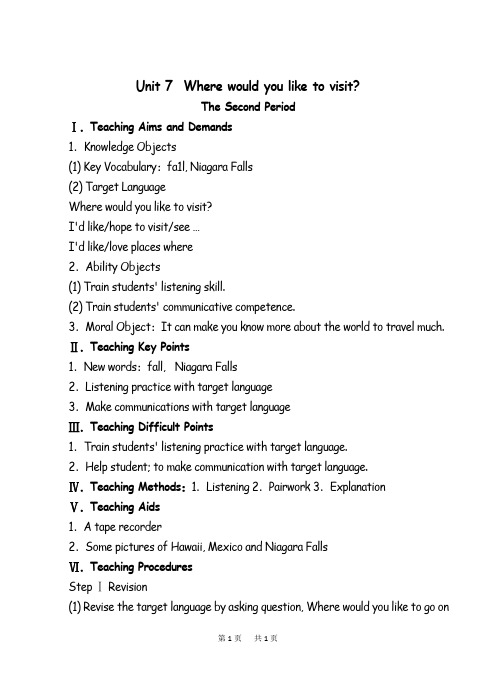
Unit 7 Where would you like to visit?The Second PeriodⅠ.Teaching Aims and Demands1.Knowledge Objects(1) Key Vocabulary:fa1l, Niagara Falls(2) Target LanguageWhere would you like to visit?I'd like/hope to visit/see …I'd like/love places where2.Ability Objects(1) Train students' listening skill.(2) Train students' communicative competence.3.Moral Object:It can make you know more about the world to travel much. Ⅱ.Teaching Key Points1.New words:fall, Niagara Falls2.Listening practice with target language3.Make communications with target languageⅢ.Teaching Difficult Points1.Train students' listening practice with target language.2.Help student; to make communication with target language. Ⅳ.Teaching Methods:1.Listening 2.Pairwork 3.Explanation Ⅴ.Teaching Aids1.A tape recorder2.Some pictures of Hawaii, Mexico and Niagara FallsⅥ.Teaching ProceduresStep Ⅰ Revision(1) Revise the target language by asking question, Where would you like to go onvacation? Get several students to give different answers.Then ask them to work in pairs to practise with:Where would you like to go on vacation?I'd like/love to … because I like … vacations.(2) Check homework by asking several ones to read their conversations.(3) Check homework by dictating the following words:tiring, educational, fascinating, thrilling, relaxing, dangerous, exotic, trek, jungle, take it easy, explore, historicAfter dictating, have students check in pairs. Make a survey by asking them to put up hands to see how many have written out all the words correctly.Step Ⅱ 2aThis activity provides listening practice using the target language.Read the instructions to the students.Look at the four sentences in the box. They are from a conversation, but they are not in the right order. We will listen to a conversation talking about going on a vacation. We can see the number in front of the fourth sentence. It's a sample answer.Please write the right numbers before the first three sentences in the blanks.Then play the tape. Students only listen this time. Try to catch the main idea of the conversation. Next play the tape again. Students listen and write the numbers in the blanks.Check the answers.: 3 4 2 1Step Ⅲ 2bThis activity provides listening practice using the target language, too.Read the instructions to students, and make sure that they know what to do.Look at the first column, “Place”. Someone doesn't like going to these places.Why? Choose the reason for each place from the second column. Write the letters of the reasons in the blanks before the places. Let's read the contents inthe chart first. Get them to read the places and reasons several times. Then say, we'll listen to the same recording again. Listen and match each place with a reason for not going there. Play the recording again. Ask students to fill in their answers.Check the answers:1.b 2.a 3.cStep Ⅳ 2cThis activity provides guided oral practice using the target language.Read the instructions to the students. Tell them to use the information in Activities 2a and 2b to role play conversations. (Holding a picture of Hawaii) . I hope to visit Hawaii some day.Get a student to answer, So do I. I like places where the weather is always warm.Showing a picture of Mexico, ask two students to make up similar conversations. Note to use the information in Activities 2a and 2b.Do the same with the third place Niagara Falls.Say, Now please role play the conversations in pairs, using the information in Activities 2a and 2b. Each pair makes one at least. As the students work, move around the room checking progress of the pairs and offering help as needed. Ask one or two move pairs to say their conversations to the class.Step 5 Grammar FocusPresentation the conversation below by saying to the students and writing it on the blackboard :Where would you like to visit?I'd like to go somewhere relaxing.Draw a line under the word relaxing.Then ask the children the same questions and tell them to answer in their own words. For example,I'd like to go somewhere interesting.I'd like to go somewhere exotic.After asking several children to give answers with different adjectives, get them to practice in pairs. Each pair makes two conversations.Next ask several pairs to share their conversations with the class.Then say, the adjectives usually come before the nouns, such as, an educational vacation, a tiring trip. But in the sentences which are using the word something or somewhere, the adjective should be put after the pronouns. For example: I'd like to go somewhere fascinating.I'd love to eat something delicious.After that, presentation another pair of sentences. Say to the students and write down on the blackboard:Where would you like to visit?I hope to go to France some day.Explain sentences with some day in English orally, like this,I hope to go to France some day. This sentence means I hope to go to France some day, but I'm not sure I will. Maybe I will go there in the future and maybe I won't. The sentences with some day are often used to express that.Then have the children make up more sentences.Step Ⅵ SummaryIn this class, we've done some listening practice with target language. We have also practiced our oral English in pairs. And we've discussed something on grammar.Step Ⅶ Homework1.Write out two pairs of sentences like this:Where would you like to visit?I'd like to go somewhere relaxing.Where would you like to visit?I hope to go to France some day.2.Practice the target language orally with the classmates.Step Ⅷ Blackboard DesignUnit 7 Where would you like to visit?Section AThe Second Period 1.Answers to Activity 2a:3 4 2 1Ⅱ.Answers to Activity 2b:1.b 2.a 3.cⅢ.Grammar Focus:1.Where would you like to visit?I'd like to go somewhere relaxing.2.Where would you like to visit?I hope to go to France some day.。
九年级英语-where_would_you_like_to_visit学案2(九年级英语)AUMwKn
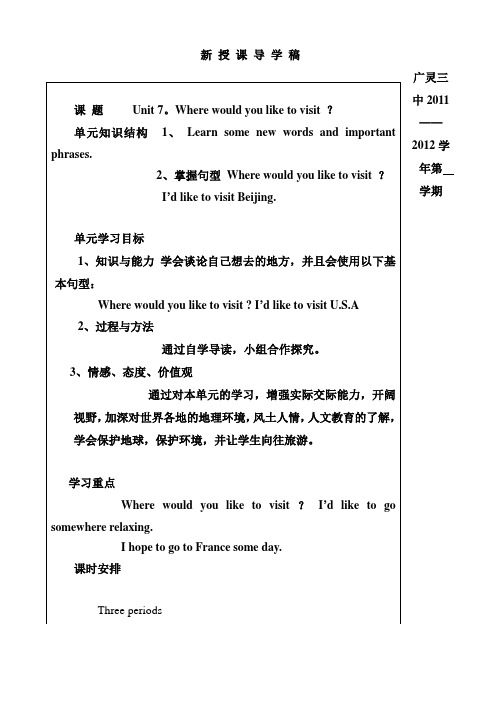
旅途中有惊有喜,有欢有笑,有山有水,有稥有色。同学们可以轻松地去领略祖国的大好河山。教师配合给出一些图片、录音,使学生能听懂有关旅游景点的简单介绍。会说出自己想要去哪里旅游参观及原因。
课前预习
1、预习本课时的单词,准确发音,掌握词义,熟记例句。
2、I hope ____(see)my friends soon.
lively sight including tower
church convenient undergrowould you like to go?
Where would you like to go on vacation ?
I’d like to go somewhere relaxing.
3、Several ____(foreign)visited our school yesterday.
4、I’d like to go to_place where I can swim(对划线部分提问).
5、All of us love _____(和平)。
新授课导学稿
广灵三中2011——2012学年第学期
学习重点
Where would you like to visit?I’d like to go somewhere relaxing.
I hope to go to France some day.
课时安排
Three periods
新授课导学稿
广灵三中2011——2012学年第学期
第1课时
课题Unit 7。Where would you like to visit?
I hope to go to France some day.
I’d love to visit Mexico.
九级英语UnitWherewouldyouliketovisit教案
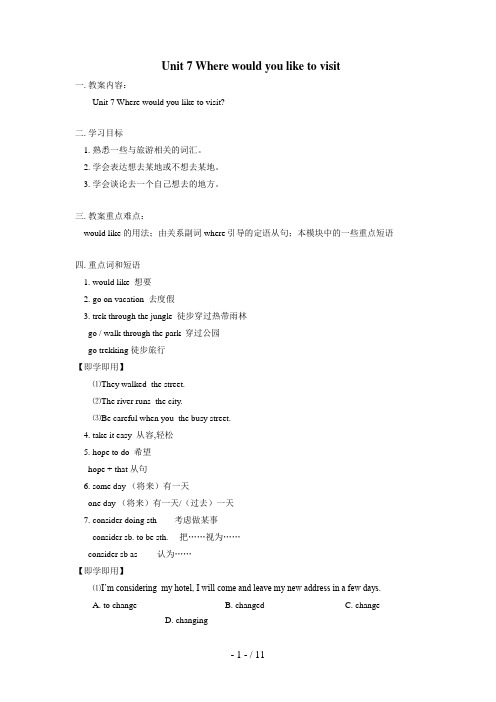
Unit 7 Where would you like to visit一. 教案内容:Unit 7 Where would you like to visit?二. 学习目标1. 熟悉一些与旅游相关的词汇。
2. 学会表达想去某地或不想去某地。
3. 学会谈论去一个自己想去的地方。
三. 教案重点难点:would like 的用法;由关系副词where引导的定语从句;本模块中的一些重点短语四. 重点词和短语1. would like 想要2. go on vacation 去度假3. trek through the jungle 徒步穿过热带雨林go / walk through the park 穿过公园go trekking 徒步旅行【即学即用】⑴They walked the street.⑵The river runs the city.⑶Be careful when you the busy street.4. take it easy 从容,轻松5. hope to do 希望hope + that 从句6. some day (将来)有一天one day (将来)有一天/(过去)一天7. consider doing sth 考虑做某事consider sb. to be sth. 把……视为……consider sb as 认为……【即学即用】⑴I’m considering my hotel, I will come and leave my new address in a few days.A. to changeB. changedC. changeD. changing⑵This book is considered a great help to students of English.A. to beB. beingC. isD. was8. the capital of sp ……的首都 / 省会9. one of the liveliest cities in Europe 欧洲最有活力的城市之一one of the most famous churches in the world 世界上最著名的教堂之一10. fantastic sights 奇妙的景色11. in general 通常12. quite an expensive place 一个高消费的地方13. translate things for sb 为某人翻译事情14. unless 除非【即学即用】⑴除非天气很冷,我爸爸通常开着窗户睡觉。
九年级英语Wherewouldyouliketovisit教案_2
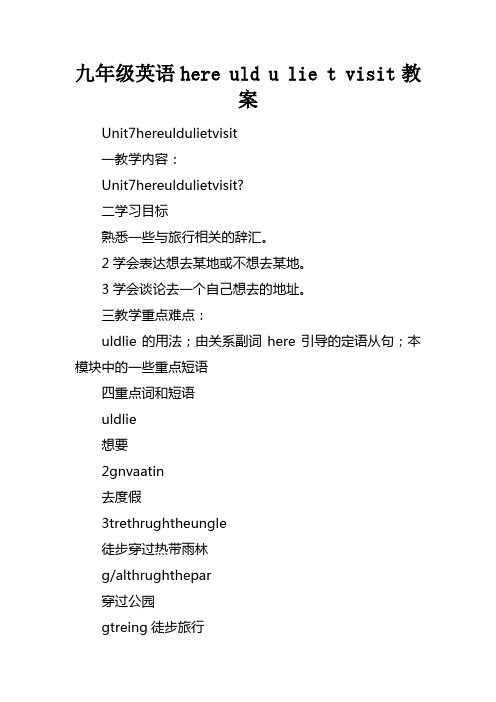
九年级英语here uld u lie t visit教案Unit7hereuldulietvisit一教学内容:Unit7hereuldulietvisit?二学习目标熟悉一些与旅行相关的辞汇。
2学会表达想去某地或不想去某地。
3学会谈论去一个自己想去的地址。
三教学重点难点:uldlie的用法;由关系副词here引导的定语从句;本模块中的一些重点短语四重点词和短语uldlie想要2gnvaatin去度假3trethrughtheungle徒步穿过热带雨林g/althrughthepar穿过公园gtreing徒步旅行【即学即用】⑴Thealedthestreet⑵Theriverrunstheit⑶Bearefulhenuthebusstreet4taeiteas从容,轻松hpetd希望hpe+that从句6seda(以后)有一天neda(以后)有一天/(过去)一天7nsiderdingsth考虑做某事nsidersbtbesth把……视为……nsidersbas以为……【即学即用】⑴I’nsideringhtel,IilleandleaveneaddressinafedasAthangeBhangedhangeDhanging⑵Thisbisnsidered agreathelptstudentsfEnglishAtbeBbeingisDas8theapitalfsp……的首都/省会9neftheliveliestitiesinEurpe欧洲最有活力的城市之一nefthestfaushurhesintherld世界上最闻名的教堂之一0fantastisights奇异的景色1ingeneral通常2quiteanexpensiveplae一个高消费的地址3translatethingsfrsb为某人翻译情形4unless除非【即学即用】⑴除非天气很冷,我爸爸通常开着窗户睡觉。
fatherusuallsleepstheindpenit’sverld⑵Thepartn’tbeginifardesn’te(改成同义句)Thepartn’tbeginartaeatrip=haveatrip去郊游6prvidesthfrsb=prvidesbithsth提供……给……7utdrativities户外活动8giveesesuggestinsfrvaatinspts给我一些旅行景点的好提议9beaa离开20gutfrhalfanhur出去半小时21anserthephne接22taeessages捎个信儿23allsbba回电24getseinfratin取得一些信息2findut弄明白26vaatinpaages旅行指南27gnanaturetur去靠近大自然的旅行28haveagreathaleathtur举行一次大型的靠近鲸的旅行29dependn取决于30advertiseentfrvaatins假日广告31sailarssthePaifi横渡太平洋32dreaabutthings=dreafdingsth 妄图做某事33hpesanddreas希望与妄图34differentanserstthequestin问题的几种不同的回答3assnaspssible=assnasuan尽快地36sthat以便37ntinueding=gnding继续做某事38ardingtthesurve依照调查39thestppularhiefb选择最流行的工作40allindsfdreas各类妄图41beillingtd情愿做某事42ahievene’sdreas实现妄图43hldn坚持44etrue实现五重点、难点、考点及疑点注释IhpetseeNiagaraFallsseda我希望有一天能去看尼亚加拉大瀑布。
九年级英语全册Unit7Wherewouldyouliketovisit教案2人教新目标版
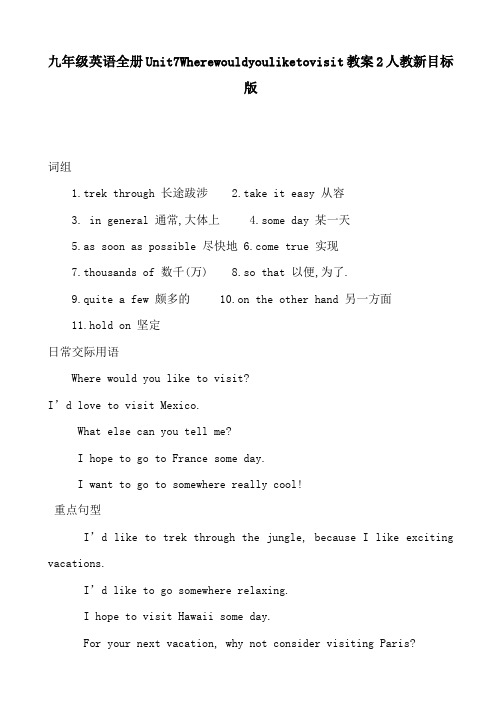
九年级英语全册Unit7Wherewouldyouliketovisit教案2人教新目标版词组1.trek through 长途跋涉2.take it easy 从容3. in general 通常,大体上4.some day 某一天5.as soon as possible 尽快地e true 实现7.thousands of 数千(万) 8.so that 以便,为了.9.quite a few 颇多的 10.on the other hand 另一方面11.hold on 坚定日常交际用语Where would you like to visit?I’d love to visit Mexico.What else can you tell me?I hope to go to France some day.I want to go to somewhere really cool!重点句型I’d like to trek through the jungle, because I like exciting vacations.I’d like to go somewhere relaxing.I hope to visit Hawaii some day.For your next vacation, why not consider visiting Paris?We don’t mind how far we have to go.知识点全解1. Where would you like to go on vacation, Sam?Sam, 你想到哪儿去度假?(1)句中的would like表示“想要”,是一种较委婉礼貌的说法,常用于以下几种句式:<1>would like+名词(或代词),意为“想要”。
例如:I’d like a new computer.我想要一台新计算机。
- 1、下载文档前请自行甄别文档内容的完整性,平台不提供额外的编辑、内容补充、找答案等附加服务。
- 2、"仅部分预览"的文档,不可在线预览部分如存在完整性等问题,可反馈申请退款(可完整预览的文档不适用该条件!)。
- 3、如文档侵犯您的权益,请联系客服反馈,我们会尽快为您处理(人工客服工作时间:9:00-18:30)。
九年级英语Wherewouldyouliketovisit教案Unit7hereouldyoulietovisit一.教学内容:Unit7hereouldyoulietovisit?二.学习目标熟悉一些与旅游相关的词汇。
学会表达想去某地或不想去某地。
学会谈论去一个自己想去的地方。
三.教学重点难点:ouldlie的用法;由关系副词here引导的定语从句;本模块中的一些重点短语四.重点词和短语ouldlie想要goonvacation去度假trethroughthejungle徒步穿过热带雨林go/althroughthepar穿过公园gotreing徒步旅行【即学即用】⑴Theyaledthestreet.⑵Theriverrunsthecity.⑶Becarefulhenyouthebusystreet.taeiteasy从容,轻松hopetodo希望hope+that从句soeday有一天oneday有一天/一天considerdoingsth考虑做某事considersb.tobesth.把……视为……considersbas认为……【即学即用】⑴I’consideringyhotel,Iilleandleaveyneaddressinafedays.A.tochangeB.changedc.changeD.changing⑵ThisbooisconsideredagreathelptostudentsofEnglish.A.tobeB.beingc.isD.asthecapitalofsp……的首都/省会oneoftheliveliestcitiesinEurope欧洲最有活力的城市之一oneoftheostfaouschurchesintheorld世界上最著名的教堂之一0.fantasticsights奇妙的景色1.ingeneral通常quiteanexpensiveplace一个高消费的地方3.translatethingsforsb为某人翻译事情unless除非【即学即用】⑴除非天气很冷,我爸爸通常开着窗户睡觉。
yfatherusuallysleepstheindoopenit’sverycold.⑵Thepartyon’tbeginifarydoesn’te.Thepartyon’tbeginary.taeatrip=haveatrip去郊游providesthforsb=providesbithsth提供……给……outdooractivities户外活动giveesoesuggestionsforvacationspots给我一些旅游景点的好提议beaay离开0.gooutforhalfanhour出去半小时1.anserthephone接电话2.taeessages捎个信儿3.callsbbac回电getsoeinforation得到一些信息findout弄明白vacationpacages旅行指南goonanaturetour去亲近大自然的旅行haveagreathaleatchtour举行一次大型的亲近鲸的旅游dependon取决于0.advertiseentforvacations假日广告sailacrossthePacific横渡太平洋dreaaboutthings=dreaofdoingsth梦想做某事3.hopesanddreas希望与梦想differentanserstothequestion问题的几种不同的回答assoonaspossible=assoonasyoucan尽快地sothat以便continuedoing=goondoing继续做某事accordingtothesurvey根据调查theostpopularchoiceofjob选择最流行的工作0.allindsofdreas各种梦想1.beillingtodo愿意做某事2.achieveone’sdreas实现梦想3.holdon坚持4.etrue实现五.重点、难点、考点及疑点注释IhopetoseeNiagaraFallssoeday.我希望有一天能去看尼亚加拉大瀑布。
IhopetovisitHaaiioneday.我希望有一天能去夏威夷。
⑴hope用作动词时,后面接不定式或that从句,但不能接“宾语+不定式”。
例如:ehopetoseeyouagain.=ehopeecanseeyouagain.我们希望再次见到你。
Ihopeyoucanhelpeithyath.希望你能帮我学数学。
相关链接:hope与ish的区别:①hope与ish均可表示“想,希望”,宾语用不定式。
例如:IhopetovisittheGreatall.我希望去参观长城。
②ish后接“宾语+不定式”,其意相当于“想要,希望”,不定式作宾语补足语,而hope无此用法。
例如:Hisparentsishhitobeeadoctorhilehehopestobeateacher.他父母希望他当医生而他却想当老师。
③hope和ish都可以跟that从句,但hope加that从句表示“希望”或可以实现的愿望;而ish加that从句表示“愿望”,通常指某种强烈而又难以实现的“愿望”,因此从句用虚拟语气。
例如:Ihopeyou’llbebettersoon.我希望你能很快好起来。
IishIcouldflylieabird.但愿我能像鸟一样飞。
④ish可以表示良好的“祝愿”,后面接“宾语+宾补”,而hope不能这样用。
例如:Iishyouhappy.我祝你幸福。
⑤在简单句中,如要表示希望某事不会发生时,应说Ihopenot,不可用Idon’thopeso;表示希望某事会发生时,说Ihopeso。
而ish无此用法。
⑵oneday既可以指过去某一天,也可以指将来某一天。
表示将来某一天还可用soeday,有“总有一天”之意。
例如:oneday,healedoutofthehouseithasallbagandnevercaebac.一天,他带了个小提包走出家门,再也没有回来。
you’llbesorryforthisoneday.总有一天你会因此事而致歉的。
eilleetagainsoeday,Ibelieve.我相信总有一天我们会再见面的。
【即学即用】⑴IhopeagoodjobinaforeignpanyafterIgraduateschool.A.tofind;froB.finding;froc.tofind;atD.finding;at⑵Ieveryonegoodlucintheingneyear.A.hopeB.antc.supposeD.ish⑶IIereabutterflyno.A.hopeB.ishc.thinD.guess⑷IhopeIcanbeanengineer.A.everydayB.eachdayc.theotherdayD.soeda⑸lastyearIdroppedinandfoundherbadlyill.A.AdayB.onedayc.ThatdayD.Thedav-ing型形容词和v-ed型形容词本单元出现了大量v-ing型形容词,那么大家对它的用法熟悉吗?在英语中,某些动词的后面加上-ing或-ed,可以变成形容词。
v-ing型形容词具有主动或进行的含义,是人或物本身所具有的品质。
常见的词有:surprise—surprising令人惊奇的excite—exciting 令人兴奋的bore—boring令人讨厌的interest—interesting有趣的develop—developing发展中的ove—oving感人的inspire—inspiring鼓舞人心的v-ed型形容词具有被动或已完成的含义,是由于受到某种影响而产生的结果。
常见的词有:surprise—surprised感到惊奇的bore—bored感到厌恶的excite—excited感到兴奋的interest—interested感兴趣的develop—developed发达的ove—oved受感动的inspire—inspired受到鼓舞的please—pleased高兴的Foryournextvacation,hynotconsidervisitingParis?下一次假期为什么不考虑去巴黎呢?hynot+动词原形相当于hydon’tyou+动词原形,表示“为什么不……?”,常用来向别人提建议。
hynotstudyhard?为什么不努力学习?hydon’tyouasthepoliceanforhelp?怎么不向那个警察寻求帮助呢?知识链接表示建议的句型还有:Shalledosth?我们去做……,好吗?Let’sdosth!咱们去做……吧!you’dbetterdosth.你最好……hat/Hoaboutdoing…?……怎么样?consider表示“考虑,细想”,相当于thinabout,后面接动词时,应用动词的-ing形式。
Ifirstconsideredritingtohi,butthendecidedtoseehi.我开始想写信给他,但后来决定去见他。
Isn’titsupposedtobeveryhot?难道天气不应该是很热的吗?这是一个否定形式的一般疑问句,用来表示说话人提出自己的建议或看法,并希望得到对方肯定的答复。
有时也表示惊讶、不相信、挖苦、批评等意义。
Isn’theaLeagueeber?难道他不是团员吗?Haven’tyounonhiyet?Isayouhavingdinnerithhijustno.你难道还不认识他吗?刚才我还见你和他一起吃饭了呢。
besupposedto的意思与should近似,意为“被期望或被要求做某事”。
AIsupposedtocleanalltheroosorthesingleone?我是应该打扫所有房间还是这个单间?you’resupposedtostartorat8:30everyorning.你应该每天早晨八点半开始工作。
yfailyandIanttotaeatripthissuersoehereineasternchina.我和我的家人想在今年夏天去中国东部的某个地方旅游。
⑴taeatrip“去旅行”。
trip为名词。
如:HetooatripinShanghailastsuer.他去年夏天去了上海旅游。
⑵介词in在这里表示“位于”,表示在某范围之内;to表示在某范围之外;on表示“接壤”。
Shanghailiesintheeastofchina.上海位于中国东部。
japanliestotheeastofchina.日本位于中国的东面。
